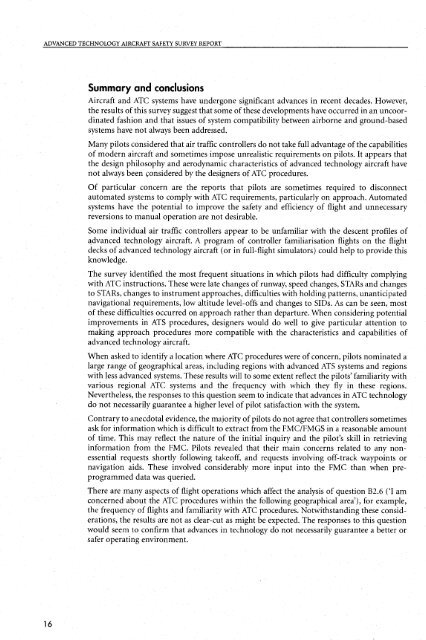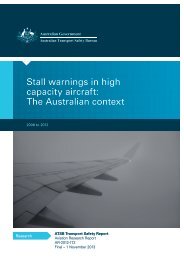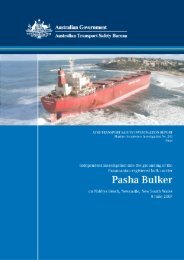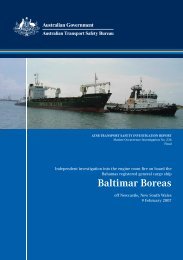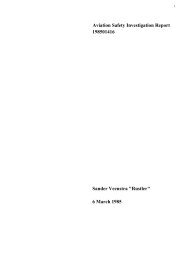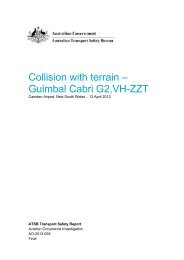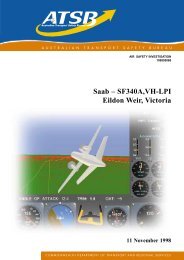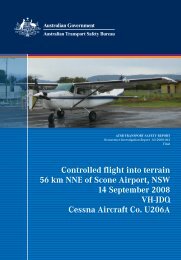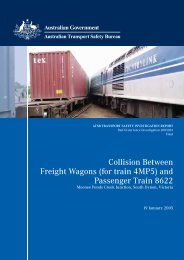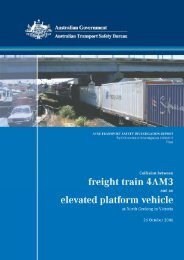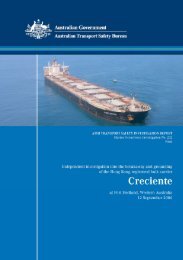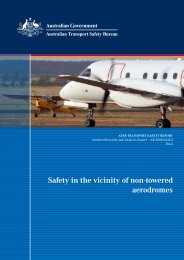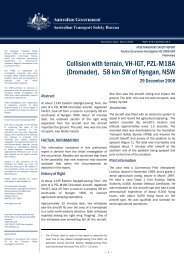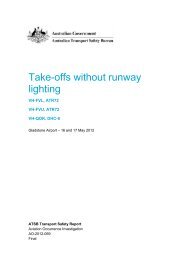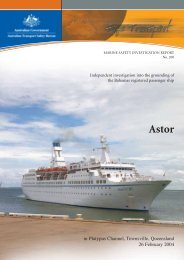Advanced Technology Aircraft Safety Survey Report - Australian ...
Advanced Technology Aircraft Safety Survey Report - Australian ...
Advanced Technology Aircraft Safety Survey Report - Australian ...
Create successful ePaper yourself
Turn your PDF publications into a flip-book with our unique Google optimized e-Paper software.
ADVANCED TECHNOLOGY AIRCRAFT SAFETY SURVEY REPORT<br />
16<br />
Summary and conclusions<br />
<strong>Aircraft</strong> and ATC systems have undergone significant advances in recent decades. However,<br />
the results of this survey suggest that some of these developments have occurred in an uncoor-<br />
dinated fashion and that issues of system compatibility between airborne and ground-based<br />
systems have not always been addressed.<br />
Many pilots considered that air traffic controllers do not take full advantage of the capabilities<br />
of modern aircraft and sometimes impose unrealistic requirements on pilots. It appears that<br />
the design philosophy and aerodynamic characteristics of advanced technology aircraft have<br />
not always been Considered by the designers of ATC procedures.<br />
Of particular concern are the reports that pilots are sometimes required to disconnect<br />
automated systems to comply with ATC requirements, particularly on approach. Automated<br />
systems have the potential to improve the safety and efficiency of flight and unnecessary<br />
reversions to manual operation are not desirable.<br />
Some individual air traffic controllers appear to be unfamiliar with the descent profiles of<br />
advanced technology aircraft. A program of controller familiarisation flights on the flight<br />
decks of advanced technology aircraft (or in full-flight simulators) could help to provide this<br />
knowledge.<br />
The survey identified the most frequent situations in which pilots had difficulty complying<br />
with ATC instructions. These were late changes of runway, speed changes, STARs and changes<br />
to STARs, changes to instrument approaches, difficulties with holding patterns, unanticipated<br />
navigational requirements, low altitude level-offs and changes to SIDs. As can be seen, most<br />
of these difficulties occurred on approach rather than departure. When considering potential<br />
improvements in ATS procedures, designers would do well to give particular attention to<br />
making approach procedures more compatible with the characteristics and capabilities of<br />
advanced technology aircraft.<br />
When asked to identify a location where ATC procedures were of concern, pilots nominated a<br />
large range of geographical areas, including regions with advanced ATS systems and regions<br />
with less advanced systems. These results will to some extent reflect the pilots’ familiarity with<br />
various regional ATC systems and the frequency with which they fly in these regions.<br />
Nevertheless, the responses to this question seem to indicate that advances in ATC technology<br />
do not necessarily guarantee a higher level of pilot satisfaction with the system.<br />
Contrary to anecdotal evidence, the majority of pilots do not agree that controllers sometimes<br />
ask for information which is difficult to extract from the FMC/FMGS in a reasonable amount<br />
of time. This may reflect the nature of the initial inquiry and the pilot’s skill in retrieving<br />
information from the FMC. Pilots revealed that their main concerns related to any nonessential<br />
requests shortly following takeoff, and requests involving off-track waypoints or<br />
navigation aids. These involved considerably more input into the FMC than when preprogrammed<br />
data was queried.<br />
There are many aspects of flight operations which affect the analysis of question B2.6 (‘I am<br />
concerned about the ATC procedures within the following geographical area’), for example,<br />
the frequency of flights and familiarity with ATC procedures. Notwithstanding these considerations,<br />
the results are not as clear-cut as might be expected. The responses to this question<br />
would seem to confirm that advances in technology do not necessarily guarantee a better or<br />
safer operating environment.


